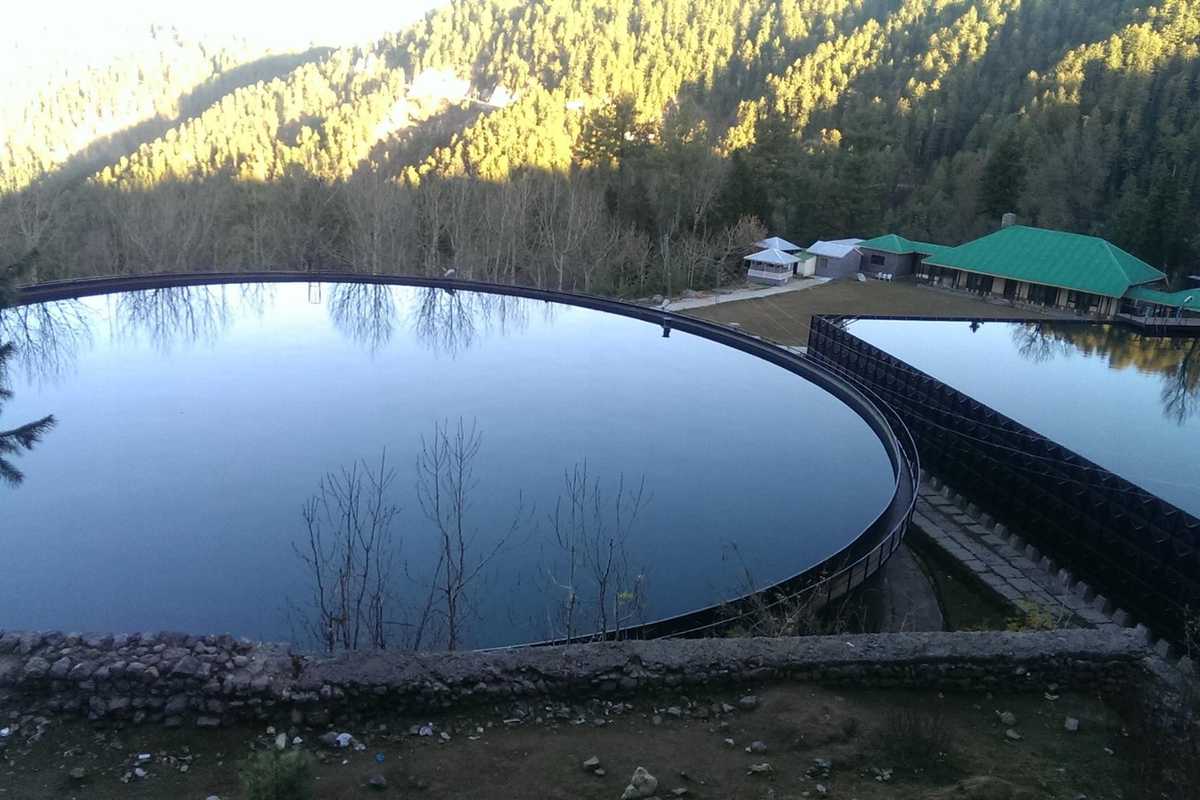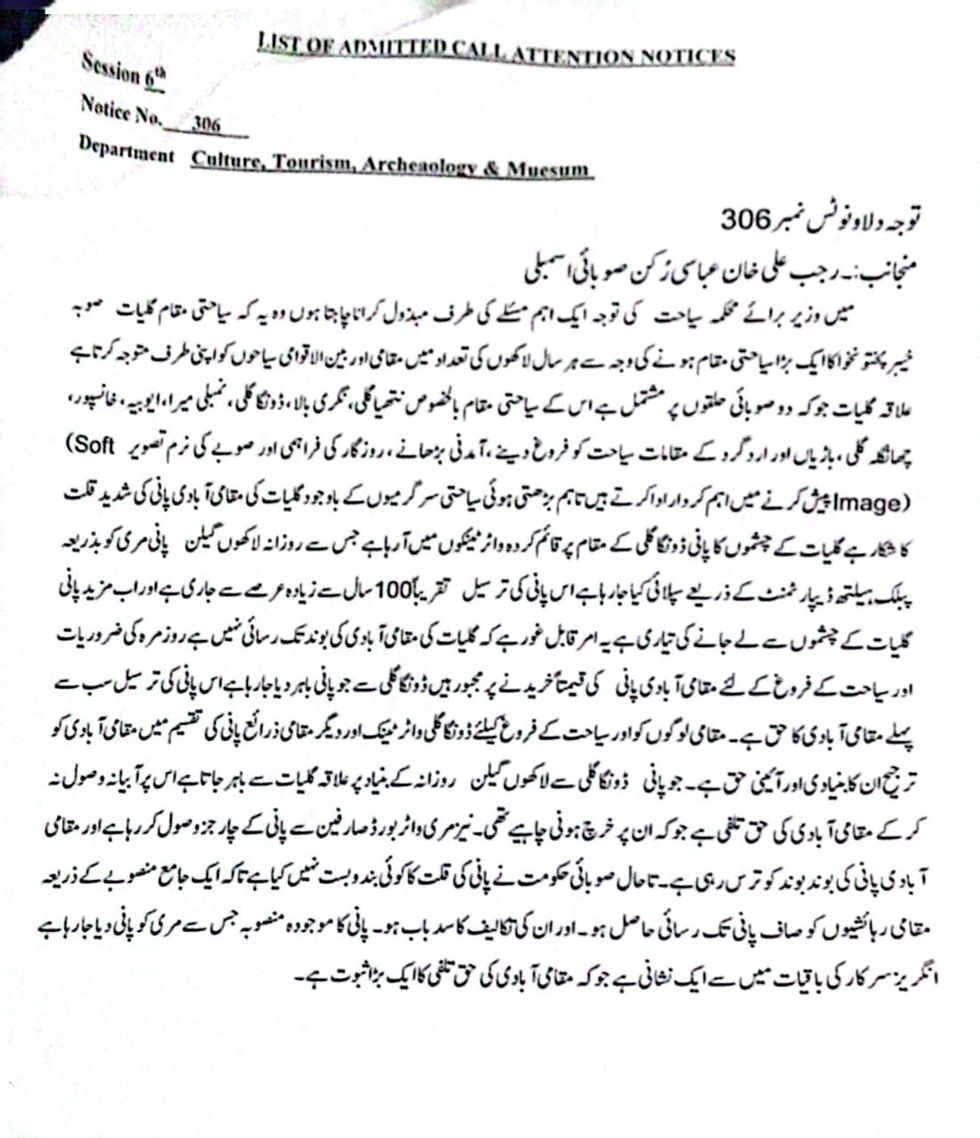Pakistan’s KP plans to halt 131-year-old water sharing agreement with Punjab
KP Assembly member Rajab Ali Abbasi says Galiyat residents buy water to survive while millions of gallons flow to Murree

Kamran Ali
Correspondent Nukta
Kamran Ali, a seasoned journalist from Khyber Pakhtunkhwa, Pakistan, has a decade of experience covering terrorism, human rights, politics, economy, climate change, culture, and sports. With an MS in Media Studies, he has worked across print, radio, TV, and digital media, producing investigative reports and co-hosting shows that highlight critical issues.

A water reservoir in Nathia Gali in the Abbottabad District of Khyber Pakhtunkhwa province.
Courtesy: FB/Rediscover Pakistan
The government of Pakistan's province of Khyber Pakhtunkhwa (KP) has suspended work on laying new pipelines for a water supply project that has provided free water to Punjab for the past 131 years, while authorities have also launched a review of the longstanding arrangement, hinting at possible changes to the water-sharing system.
The review follows growing complaints from residents of the Galiyat region, including Dunga Gali, who say their local water crisis has worsened as climate change shrinks supplies, while millions of gallons are still diverted daily to Murree, a major tourist town in Punjab.
A research study available on the International Water Association’s website highlights that the supply of water from Dunga Gali area of Abbottabad district in KP to Murree district in Punjab was initiated in 1894.
Since then, 2.27 million liters per day (MLD) of water has been channeled to the hill station. However, after accounting for 25 per cent conveyance losses, the effective supply stands at 1.702 MLD. Of this, 0.766 MLD — or 45 per cent — is allocated to cantonment areas, while the remaining 0.936 MLD — 55 per cent — is directed towards residential and commercial zones, the study notes.
Mounting hardship for locals
Rajab Ali Abbasi, a member of the KP Assembly from the ruling Pakistan Tehreek-e-Insaf (PTI) — which is the main opposition party at the center — drew attention to the severe water shortage in Galiyat through a call attention notice.
“The local population has a right to its water," he said. "Yet, for over a century, millions of gallons of water have been supplied free of charge to Murree every day, while residents are left desperate for a drop and are forced to buy water to survive."

Ali criticized the project, referring to it as a remnant of the British colonial era, and called for its termination to prevent further injustice to the local population.
Iftikhar Ahmed, a hotel owner in Dunga Gali, told Nukta that the entire Galiyat region, including Dunga Gali, is facing a severe water shortage. “Reduced snowfall and prolonged droughts driven by climate change are rapidly depleting our water sources," he said, adding that the continued diversion of water to Murree has further worsened the situation.
Ahmed said he is compelled to buy 500 gallons of water daily for his hotel for PKR 7,000, while for household needs, he has to transport 200 gallons from a spring located some 20 kilometers away. “Dunga Gali has nine hotels and over 150 houses, and all are enduring the same struggle,” he added.
Bilal Ahmed, a local businessman from Murree, told Nukta that the town heavily depends on water sourced from Dunga Gali. “If the water supply from Dunga Gali is cut off, Murree’s tourism industry will collapse,” he warned.
According to the District Administration of Murree, Khanitak, Shawalla, Masoot, and Dharjawa also serve as water source access points. However, the hill station currently receives only 1.2 million gallons per day (MGD) against a daily requirement of 3 MGD, leaving a significant shortfall in supply.
No royalty since colonial times
Aftab Alam, KP’s Minister for Law, stated that between 1891 and 1894, during British rule, a pipeline was constructed to supply water to the Murree Cantonment — a system that remains in use today without any royalty being paid.
“The Public Health Department of Punjab, through the Murree Water Board, collects payments from consumers without offering any compensation to KP. In fact, the water being pumped by the Galiyat Development Authority (GDA) is managed at our own cost,” Alam explained.
According to Alam, the Punjab government had initiated another water project from Dunga Gali, but it was halted after objections from the KP government. “The Inter-Provincial Coordination Committee recommended that no new construction will be carried out by any party, and all ongoing construction activity related to the issue will be put on hold till the next decision,” he informed.
Nazeer Ahmed Abbasi, KP’s Minister for Revenue, expressed regret that over the past 130 years, the Punjab government has made no arrangements for Murree’s independent water supply. “KP is owed PKR 40 billion–50 billion in unpaid water royalties, yet Punjab continues to ignore its responsibilities. The Speaker must issue a direct ruling to immediately halt the water supply to Punjab,” he urged.
Committee to resolve the matter
Babar Saleem Swati, Speaker KP Assembly, disagreed with the members' proposals to immediately halt the water supply. Instead, he summoned officials from the departments of tourism, public health, revenue, and the Murree Water Board and referred the matter to the assembly’s standing committee, stating that a direct order to cut off water for the general public could not be issued. “The committee would review the matter and its decision would be binding on governments,” he ruled.
Ahmed Kundi, Parliamentary Leader of the Pakistan Peoples Party (PPP) in the KP Assembly, suggested that KP’s water issue should be taken to the Council of Common Interests (CCI), calling it the province’s "biggest case".
He pointed out that around three million acre-feet of water flows out of KP to other provinces without any monitoring or compensation. “Under Article 154 of the constitution, a CCI meeting must be held every 90 days," Kundi said. "Yet, it has not been convened for over a year. If the federal government still fails to call the meeting, we will launch a joint protest."
What’s next?
GDA also recognized the ongoing water crisis, noting that ,“Several water supply schemes are underway in various towns, including 50,000-gallon projects in Khanspur and Changla Gali, a 50,000-gallon scheme in Khaira Gali and Dunga Gali, as well as 50,000-gallon and 20,000-gallon schemes in Ayubia, and a 20,000-gallon project in Thandiani, all at a total cost of PKR 150 million.”
Nazam Maqbool, a researcher on the water crisis in Pakistan, argues that the escalating shortage of water is becoming a significant point of contention between provinces regarding water allocation.
“It is essential for the nation’s political leaders and key stakeholders to fully embrace the responsibility of tackling the water crisis and openly commit to resolving it by bridging the gap between policy decisions, necessary reforms, and their execution through a comprehensive implementation strategy,” he suggested.







Comments
See what people are discussing